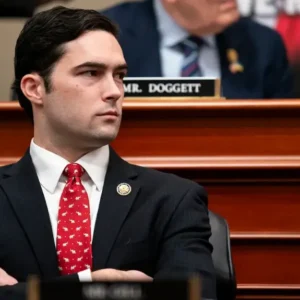On February 12, 2025, Rep. Brandon Gill (R-TX) made waves on X (formerly Twitter) by accusing the Democratic Party of orchestrating what he called “the biggest money laundering scandal in American history.”
In a widely shared video, Gill alleged that an unchecked administrative bureaucracy had mismanaged $2.7 trillion in improper payments since 2003, using taxpayer funds for political gain.
Gill’s remarks were not only a sharp critique of Democratic leadership but also a defense of federal audits and oversight initiatives.
He championed the Department of Government Efficiency (DOGE) and emphasized the need for stricter financial accountability within federal agencies. His statements reignited ongoing debates about government spending and transparency.
The congressman’s central claim was that Democrats had expanded and weaponized the administrative state, allowing a bloated bureaucracy to function without accountability. He suggested that this system enabled improper payments, which he characterized as a massive misuse of public funds.
According to Gill, these improper payments—totaling $2.7 trillion over two decades—went beyond simple mismanagement. He implied they were part of a deliberate effort to redirect taxpayer dollars for political benefit. His language painted a picture of a federal system riddled with inefficiency and corruption.
Critics of federal bureaucracy have long argued that excessive government spending lacks transparency. Gill’s allegations align with conservative concerns that unregulated agencies wield too much power, distributing funds without adequate oversight or accountability.
One of his most striking claims was that Democrats had “weaponized” government institutions, using taxpayer funds to serve partisan interests rather than public needs. He argued that unelected bureaucrats had too much control over policy and financial decisions, diminishing public trust.
In his video, Gill called for accountability, questioning whether federal employees responsible for these payments had ever faced consequences. He suggested that no agency heads had been fired for mismanaging funds, reinforcing his argument that the system lacks meaningful oversight.
Another major concern raised by Gill was whether the government had any mechanism to recover these lost funds. He asked if improperly disbursed payments could be reclaimed, implying that little effort had been made to retrieve wasted taxpayer dollars.
Gill used the controversy to highlight the importance of oversight initiatives like DOGE audits. He insisted that thorough audits could expose financial discrepancies, enforce transparency, and help prevent future wasteful spending.
The video quickly went viral, sparking intense reactions on social media. Supporters applauded Gill’s call for reform, arguing that the government had been misusing public funds for years without accountability. Many echoed his frustration, demanding immediate action.
Critics, however, challenged the accuracy of Gill’s claims. Some questioned the legitimacy of the $2.7 trillion figure, arguing that it was misleading or exaggerated. Others accused him of using hyperbolic rhetoric to rally political support rather than presenting verifiable facts.
The controversy highlights broader partisan tensions over government spending. Conservatives see Gill’s claims as proof that Democrats have mismanaged the bureaucracy, while liberals argue that the accusations are politically motivated and lack substantial evidence.
Beyond political divides, the debate raises real questions about the effectiveness of federal oversight. Even if Gill’s figures are disputed, the underlying issue—whether government agencies properly manage taxpayer funds—remains a pressing concern for many Americans.
Calls for reform continue to grow, with lawmakers on both sides under pressure to strengthen accountability measures. Proposals for stricter audits, increased financial transparency, and greater oversight could shape future policies on federal spending.
Ultimately, Gill’s allegations tap into a larger public demand for government efficiency. Whether his claims lead to significant policy changes or remain a partisan talking point, they reinforce the ongoing debate about how taxpayer dollars should be managed and protected.
